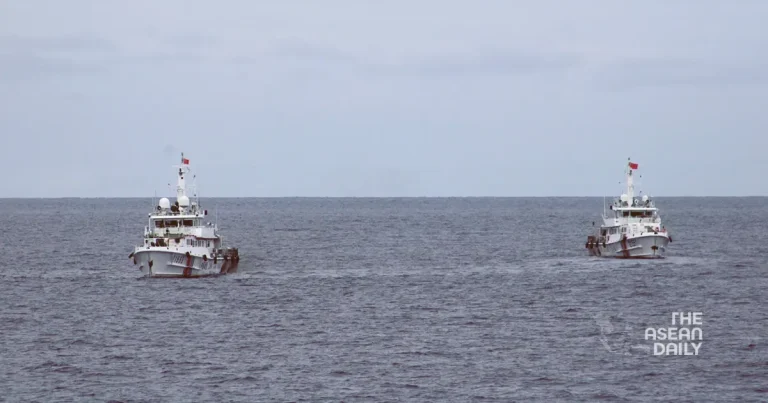14-6-2024 (MANILA) Amidst rising tensions in the hotly contested South China Sea, the Philippines has intensified its maritime patrols in anticipation of a new Chinese regulation empowering its coast guard to detain foreign vessels accused of trespassing in waters claimed by Beijing.
The regulation, set to take effect on Saturday, marks a further escalation in the long-standing territorial disputes over the resource-rich waterway, which serves as one of the world’s busiest and most economically vital trading routes.
Under the updated legislation, foreigners deemed to have illegally entered Chinese waters can be detained for up to 60 days without trial, a move that has drawn significant concern from the Philippine government and other stakeholders in the region.
President Ferdinand Marcos Jr. has previously voiced apprehension over the new Chinese regulations, describing them as “worrisome” and an “escalation of the situation.” In a stern warning, he stated that if any Filipino citizen were to be killed “by a willful act,” it would be tantamount to “an act of war.”
The South China Sea, a strategic maritime area, has been at the center of a complex territorial dispute, with China claiming a staggering 90% of its waters – a claim that has been rejected by an international tribunal in The Hague. The Philippines, Vietnam, Malaysia, Brunei, and Taiwan also assert overlapping claims in the region, further fueling tensions.
As maritime confrontations in the contested waters increase, so too does the risk of a miscalculation that could inadvertently provoke armed conflict. The Philippines has repeatedly accused China of engaging in dangerous behavior, including firing water cannons and ramming Philippine Coast Guard vessels during patrol missions. Such incidents have prompted warnings from the United States, which has pledged to defend its treaty ally, the Philippines, in the event of an armed attack on its public vessels, aircraft, armed forces, or Coast Guard in the South China Sea.
Fishing communities, whose livelihoods depend on the waters, have expressed fears about the potential for detention at sea but feel compelled to continue their operations due to economic necessity.
China’s foreign ministry spokesperson, Mao Ning, has defended the regulations, stating that they are intended “to standardize the administrative law-enforcement procedures of Coast Guard agencies and better uphold order at sea.” Ning further asserted that “individuals and entities have no need for concern as long as they have not done anything illicit.”
In response to the impending implementation of the new rules, the Philippines has increased its patrols, according to Roy Vincent Trinidad, a Philippine navy spokesperson for the West Philippine Sea. Trinidad emphasized that the Philippines is working closely with partners and allies to address the matter, noting that “even other countries are concerned about that.”
Efforts are underway to ensure the safety of Filipino fishing communities, who have long complained of harassment by Chinese vessels. “Nothing will happen. The actions right now of the Philippine navy, the armed forces, the Coast Guard, Bureau of Fisheries and Aquatic Resources, and all other maritime players of the Philippine government are preventing such a situation,” Trinidad stated.
Collin Koh, a Senior Fellow at the Institute of Defence and Strategic Studies at the S. Rajaratnam School of International Studies, described the new regulations as a form of “lawfare,” aimed at intimidating and threatening countries like the Philippines by reminding them of China’s larger naval and Coast Guard presence.
However, Koh noted that the wording of the law remains vague, as China’s Coast Guard Law, first introduced in 2021, applies to “maritime areas under Chinese jurisdiction” without clearly defining these boundaries. He warned that if China were to actually arrest Filipinos at sea, it could carry significant risks for Beijing, potentially escalating tensions and invoking the Philippines’ mutual defense treaty with the United States.
“What if, in the process of trying to apprehend trespassers under the new guidelines, you clash with Philippine maritime forces, [and] somebody dies,” Koh posited, adding that such an incident could lead to the invocation of the Philippines’ mutual defense treaty with the US, increasing the risk of armed conflict.
Koh also suggested that the application of the new law could prompt the Philippines to advance its own legal challenges against China, such as filing a new case at the Permanent Court of Arbitration in The Hague, accusing Beijing of environmental damage within the Philippine’s exclusive economic zone – the waters stretching 200 nautical miles (370km) from a state’s coastline, where a country has special rights to exploit resources and build.




